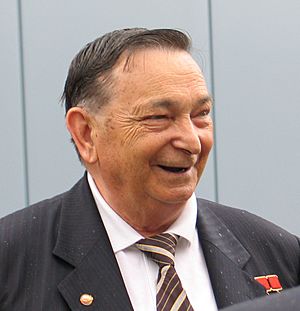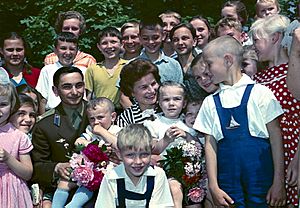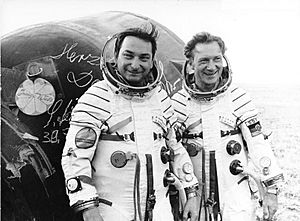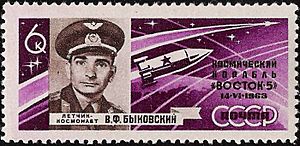Valery Bykovsky facts for kids
Quick facts for kids
Valery Bykovsky
|
|
|---|---|
 |
|
| Born |
Valery Fyodorovich Bykovsky
2 August 1934 Pavlovsky Posad, Soviet Union
|
| Died | 27 March 2019 (aged 84) |
| Nationality | Russian |
| Occupation | Pilot |
| Awards | Hero of the Soviet Union Order of Lenin |
| Space career | |
| Astronaut | |
| Rank | Major General, Soviet Air Force |
|
Time in space
|
20d 17h 48m |
| Selection | 1960 Air Force Group 1 |
| Missions | Vostok 5, Soyuz 22, Soyuz 31/Soyuz 29 |
|
Mission insignia
|
|
Valery Fyodorovich Bykovsky (Russian: Вале́рий Фёдорович Быко́вский; 2 August 1934 – 27 March 2019) was a Soviet cosmonaut. He flew on three exciting space missions. These missions were Vostok 5, Soyuz 22, and Soyuz 31. He also served as a backup pilot for two other flights.
Contents
Early Life and Becoming a Pilot
Valery Bykovsky was born in Pavlovsky Posad, Russia, on August 2, 1934. His parents were Fyodor Fyodorovich Bykovsky and Klavdia Ivanova. He had an older sister named Margarita. When Valery was four, World War II started. His family had to move several times because of the war.
When he was 14, Valery wanted to join naval school. However, his father wanted him to stay in his current school. A few days later, Valery heard a talk about the Soviet Air Force Club. This talk made him dream of becoming a pilot. At 16, he began learning about flight theory at the Moscow City Aviation Club.
Valery finished aviation school when he was 18. He then joined the Kachinsk Military Aviation Academy. He graduated at 21 and became a lieutenant. By 25, he was a jet fighter pilot. He also became a pilot and parachute instructor. He had completed over 72 parachute jumps. In 1960, Valery Bykovsky began his training to become a cosmonaut.
Valery Bykovsky's Space Career
Training for Space Missions
At 26 years old, Valery started his cosmonaut training. This training took place at the Zhukovsky Military Engineering Academy. His first job was to be the backup pilot for the Vostok 3 mission.

Vostok 5: A Record-Breaking Solo Flight
Valery Bykovsky launched into space on the Vostok 5 mission. This happened on June 14, 1963. During his flight, he did many experiments. He took pictures of Earth's horizon. He also watched how peas grew in space.
Two days into his flight, another cosmonaut, Valentina Tereshkova, flew her Vostok 6 spacecraft very close to his. They were only about five kilometers apart! Valery set a new space record on Vostok 5. He spent five days in orbit. His special call-sign during this mission was "Hawk." Even though later missions had more than one person and stayed in space longer, Valery's flight is still the longest solo spaceflight ever. While in orbit, he also became a member of the Communist Party. He was promoted to colonel on April 30, 1966.
Soyuz Program: New Challenges
Bykovsky was supposed to command the original Soyuz 2 mission. This mission was planned to launch soon after Soyuz 1. Two of the three crew members from Soyuz 2 were going to do a spacewalk. They would then enter the Soyuz 1 spacecraft.
However, during the Soyuz 1 flight, many problems happened. Mission control had to bring the spacecraft back to Earth early. This also meant they had to cancel the Soyuz 2 flight. The Soyuz 1 spacecraft crashed, and the cosmonaut, Vladimir Komarov, died. The Soyuz 2 capsule was built just like Soyuz 1. If the mission had flown, Valery and his crew would have been in danger too.
Soyuz 22: Observing Earth
Valery flew the Soyuz 22 mission with Vladimir Aksyonov. They launched on September 15, 1976. This spacecraft was originally a backup for the Apollo–Soyuz Test Project. The main goal of their mission was to study Earth. They practiced different ways to observe our planet from space.

Soyuz 31: Visiting a Space Station
His third space flight was the Soyuz 31 mission. He flew with the East German cosmonaut Sigmund Jähn. They launched on August 26, 1978. Their destination was the Salyut 6 space station.
They joined two other cosmonauts who were already on the station. All four cosmonauts did biological experiments on themselves during their stay. Valery Bykovsky and Sigmund Jähn left the station in the Soyuz 29 capsule. They landed back on Earth on September 3, 1978.
After Being a Cosmonaut
After his space flights, Valery Bykovsky spent a lot of his time promoting the Intercosmos program. This program helped different countries work together in space. Because of his age, he moved from active duty to the reserves in 1988. He became the director of the Centre of Soviet Science & Culture in East Berlin after his Soyuz 31 mission. He retired from his work around 1990.
Personal Life
Valery Bykovsky was married to Valentina Mikhailovna Sukhova. They had two sons. Sadly, in 1986, his first son passed away in an aviation accident. Valery Bykovsky died on March 27, 2019.
Awards and Honors
Valery Bykovsky received many important awards for his achievements:
- He was named Hero of the Soviet Union twice (in 1963 and 1976).
- He received the Order of Lenin three times (in 1963, 1976, and 1978).
- He was awarded the Order of the Red Star in 1961.
- He also received the Order of Friendship in 2011.
- He was a Pilot-Cosmonaut of the USSR (1963).
- He received honors from other countries, including Bulgaria, East Germany, Vietnam, and Poland.
See also
 In Spanish: Valeri Bykovski para niños
In Spanish: Valeri Bykovski para niños
 | Dorothy Vaughan |
 | Charles Henry Turner |
 | Hildrus Poindexter |
 | Henry Cecil McBay |


